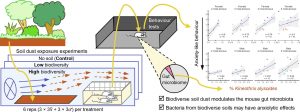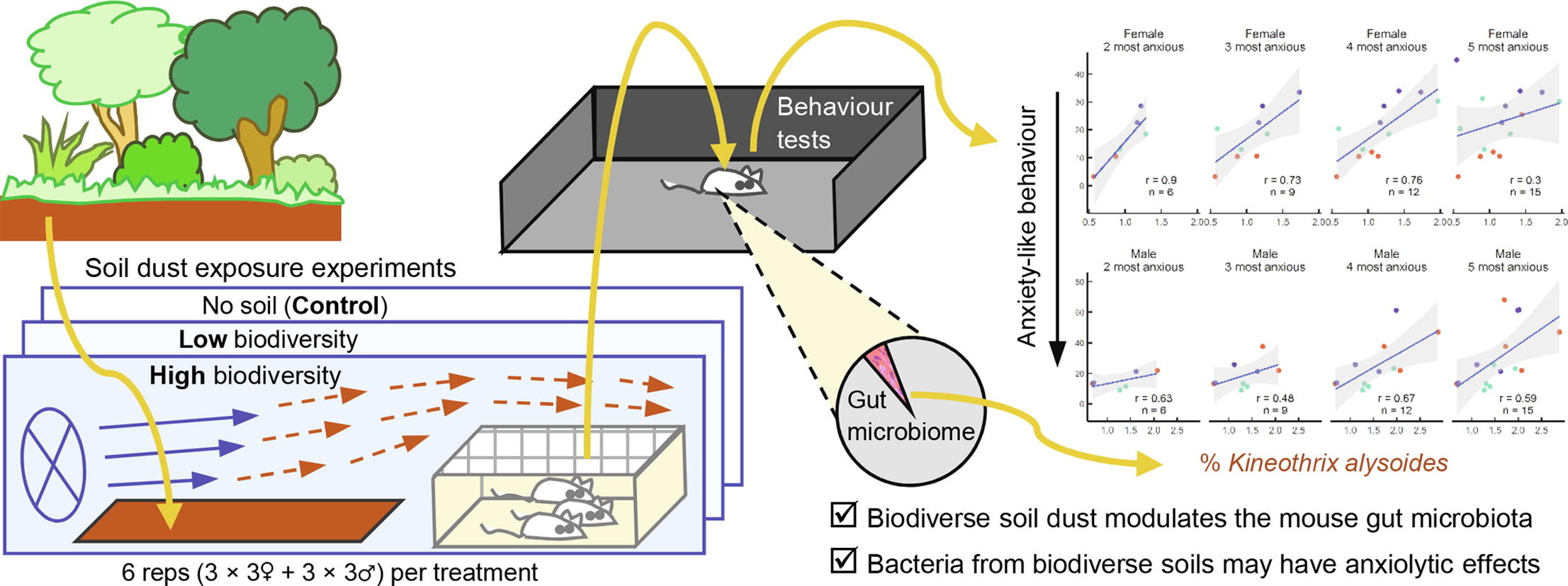 Jag har skrivit en hel del om hur vistelse utomhus i naturen har många hälsofördelar, inte minst för vårt mentala mående, och hur detta påverkar oss bl.a. med färger, dofter och ljud. Men visste du att även smuts och damm påverkar oss via vår bakterieflora när vi är i naturen?! Och detta påverkar i sin tur vårt mentala mående.
Jag har skrivit en hel del om hur vistelse utomhus i naturen har många hälsofördelar, inte minst för vårt mentala mående, och hur detta påverkar oss bl.a. med färger, dofter och ljud. Men visste du att även smuts och damm påverkar oss via vår bakterieflora när vi är i naturen?! Och detta påverkar i sin tur vårt mentala mående.
”airborne exposure to natural biodiversity can influence the gut microbiome and, in turn, human health”
(tidigare https://4health.se/?s=naturen)
Det handlar alltså om att en jord med en mångfald av mikrober kan påverka oss (också via partiklar i luften, dvs vi behöver inte nödvändigtvis smutsa ner oss) positivt via vår tarmflora. Bl.a verkar det kunna påverka vår produktion av butyrat. Detta i sin tur kan göra oss lugnare, gladare och mindre oroliga. Eftersom tarmfloran har många sätt att kommunicera med och styra vår hjärna och vårt mentala mående.
” The effect of biodiverse aerobiomes on gut microbiota was previously untested.
We demonstrate that exposure to biodiverse soil dust modulates mouse gut microbiota.
Biodiverse soil exposure may help supplement butyrate-producing bacteria in the gut.
These bacteria appear to moderate anxiety-like behaviour in the most anxious mice.
We suggest a new hypothesis linking biodiverse soils, gut health and mental health.”
” Growing epidemiological evidence links natural green space exposure with a range of health benefits, including for mental health. Conversely, greater urbanisation associates with increased risk of mental health disorders. Microbiomes are proposed as an important but understudied link that may help explain many green space-human health associations. However, there remains a lack of controlled experimental evidence testing possible beneficial effects from passive exposure to natural biodiversity via airborne microbiota. Previous mouse model studies have used unrealistic environmental microbial exposures—including excessive soil and organic matter contact, feed supplements and injections—to demonstrate host microbiota, immune biomarker, and behavioural changes. Here, in a randomised controlled experiment, we demonstrate that realistic exposures to trace-level dust from a high biodiversity soil can change mouse gut microbiota, in comparison to dust from low biodiversity soil or no soil (control) (n = 54 total mice, comprising 3 treatments × 18 mice, with 9 females + 9 males per group). Furthermore, we found a nominal soil-derived anaerobic spore-forming butyrate-producer, Kineothrix alysoides, was supplemented to a greater extent in the gut microbiomes of high biodiversity treatment mice. Also, increasing relative abundance of this rare organism correlated with reduced anxiety-like behaviour in the most anxious mice. Our results point to an intriguing new hypothesis: that biodiverse soils may represent an important supplementary source of butyrate-producing bacteria capable of resupplying the mammalian gut microbiome, with potential for gut health and mental health benefits. Our findings have potential to inform cost-effective population health interventions through microbiome-conscious green space design and, ultimately, the mainstreaming of biodiversity into health care.”
https://www.sciencedirect.com/science/article/pii/S0048969719346753?via%3Dihub
http://theleadsouthaustralia.com.au/industries/health-and-medical/biodiverse-soils-ease-anxiety/


Lämna ett svar